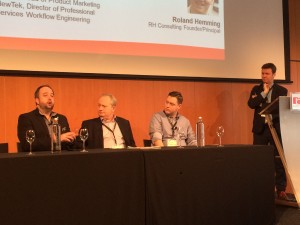Sports Venue Technology Summit: Next-gen content creation embraces fans alongside professionals
Fan engagement through the use of in-venue video has long been the goal of professional sputs teams and was a topic of conversation at last week’s Sports Venue Technology Summit at ISE in Amsterdam. In a morning panel, technology leaders from Avid, SAM (Snell Advanced Media), and NewTek discussed the changing nature of content creation, the growth of fan-generated content, and much more.

From left: NewTek’s Will Waters speaks as SAM’s Tim Felstead and Avid’s Ben Davison look on. RH Consulting’s Roland Hemming (at podium) moderates.
Echoing one of the day’s common themes, Avid Senior Solutions Specialist Ben Davison began the conversation with his thoughts on the role of social media when asked what’s most important in setting up a content-creation workflow.
“Social media is the key to where everyone is creating content, and that’s where our delivery mechanism is,” he opined. “Creating content for social media or for other delivery platforms is actually quite simple. I can see lots of people in the audience with cellphones; they’re capturing content. But, from that point, it’s what you do with that content, how you enrich that content.”
Social-media platforms are not “one size fits all” and therefore require more than one strategy when it comes to content creation. Will Waters, director of professional services, workflow engineering, NewTek, explained how fans will always gravitate toward their favourite platforms when experiencing a sports event in person, via a social-media platform like Facebook or Twitter, a team’s in-venue video presentation, or simply watching the match as it unfolds.
“It’s the community that gets wrapped together,” said Waters, “whether that’s traditional linear broadcast, whether that’s a social-media platform, whether that’s in-stadium or in-arena experience. … One of the things we have to think about even as video-systems providers is how that community gets engaged back into the production. I’m not just talking about it as a Facebook message or a tweet that we put up as a graphic in the presentation.
“The reality of the viewing habit is, we all gravitate toward the particular type of content that makes sense to us,” he continued. “This is true whether it’s the phone, whether it’s actually watching live on the pitch, or whether it’s digital signage that you may be interacting with.”
However, content creation isn’t just for the professionals. With every fan arriving at a sports event equipped with a content-capture device, the panelists discussed leveraging the content captured as part of the in-venue–video experience.
“Producing the content is relatively easy: you can get mobile-phone footage, curate that mobile-phone footage, and deliver it via a website,” noted Tim Felstead, head of product marketing, SAM. “That’s the simplest way to get in. The difference going from that sort of level to full-rights–ownership broadcasting is the quality of the curation and the quality of the production of that content.”
When it comes to content, whether professionally produced or user generated, what matters is the ease of creation and distribution in order to get content to fans as soon as possible, on whatever devices or platforms they are using.
“I think one of the key elements here is that the tools have to be easy and they have to be fast,” said Waters. “If we think about viewing habits and how people consume media, how we interact with storytelling, being first is very important. Even if you are the content owner, being first starts the conversation.”
